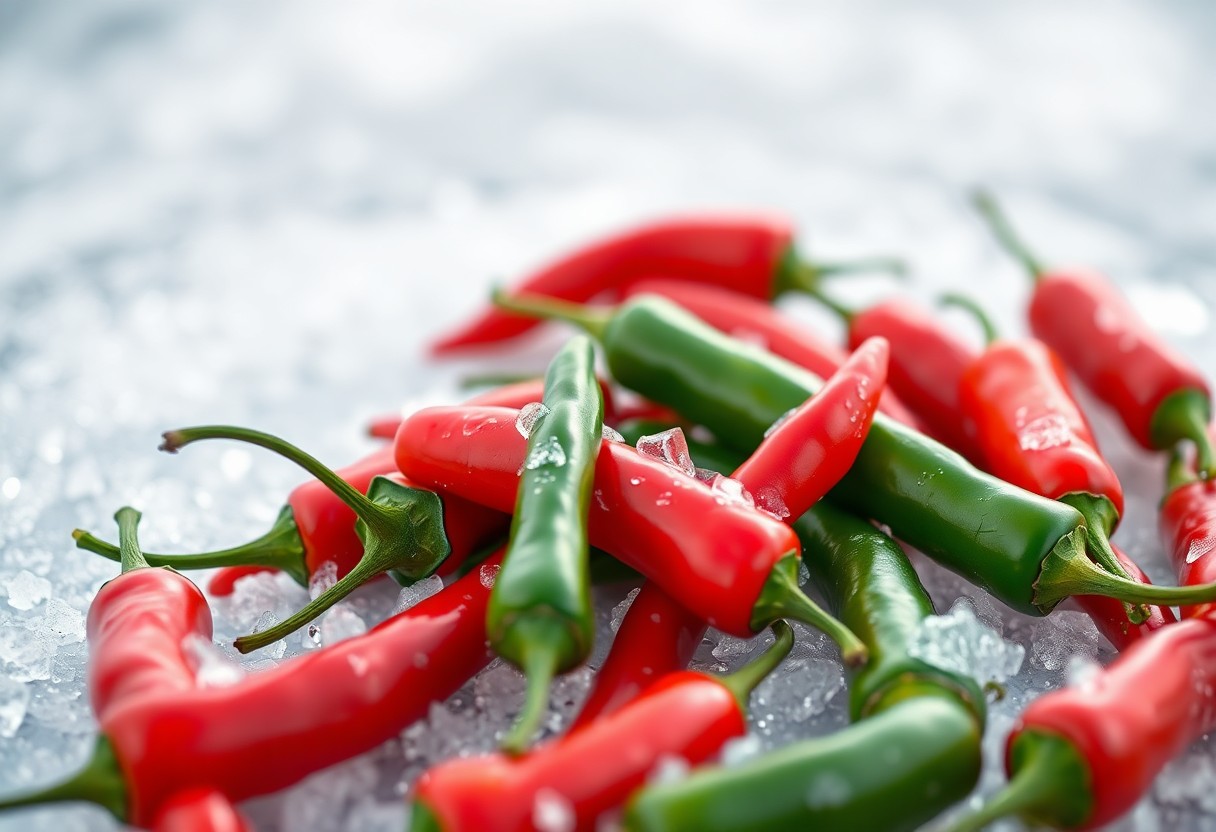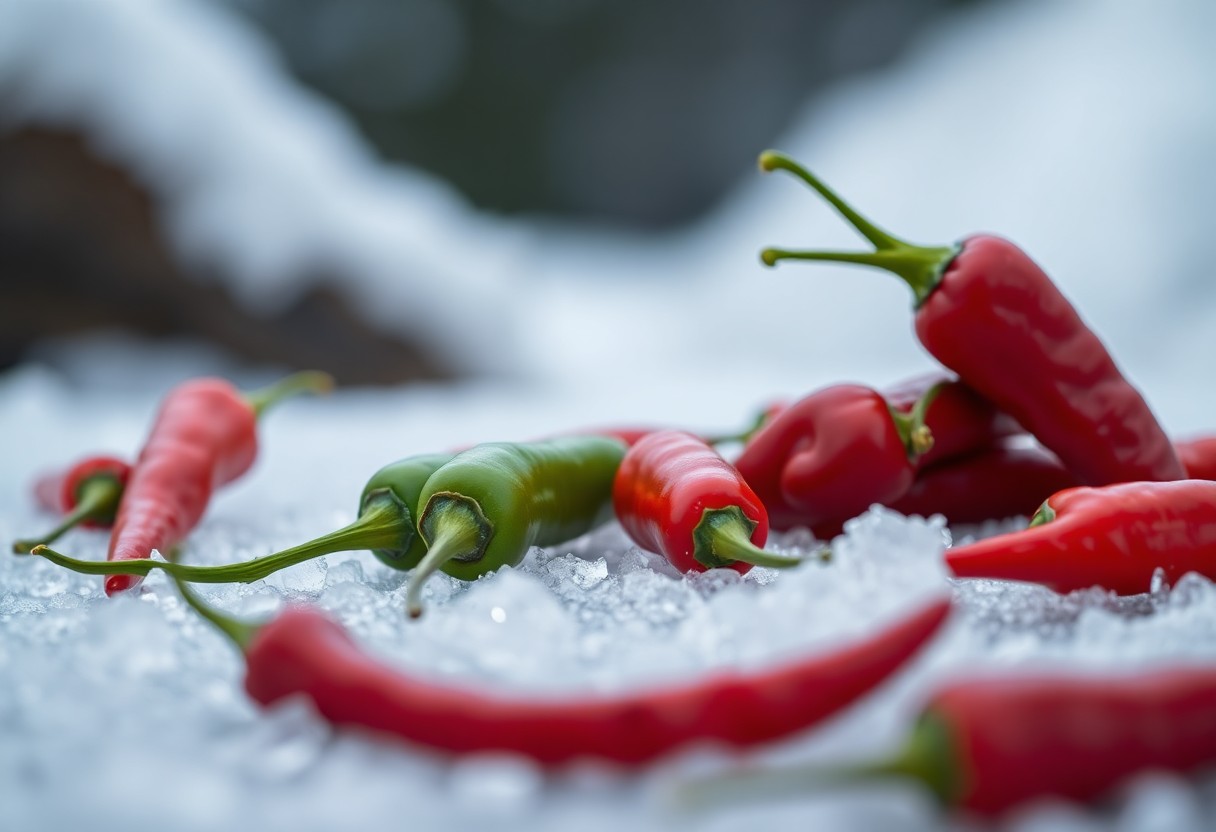As you explore ways to preserve your chilli peppers, you may wonder if freezing is a viable option. You can indeed freeze chillies to retain their flavour and heat for a longer period. Your chillies can be frozen whole, sliced, or chopped, and they will maintain their intensity and aroma. By freezing, you can enjoy your chillies throughout the year, adding flavour to your favourite dishes whenever you want.

The Basics of Freezing Chillies
Before submerging into the world of freezing chillies, you need to understand the fundamentals. Freezing is an excellent way to preserve your chillies, allowing you to enjoy them year-round. You can freeze whole, sliced, or chopped chillies, depending on your desired use.
Preparation Methods
Prior to freezing, you should prepare your chillies by washing and drying them thoroughly. You can also remove the seeds and membranes for a milder flavor. This step helps prevent spoilage and ensures your chillies freeze well.
Freezing Techniques
Meanwhile, you have several options for freezing your chillies. You can place them in airtight containers or freezer bags, making sure to remove as much air as possible. This helps prevent freezer burn and preserves your chillies’ flavor and texture.
Also, you can use the flash freezing method, where you spread your chillies on a baking sheet and freeze them before transferring them to a container or bag. This method prevents your chillies from sticking together, making them easier to use in your favorite recipes. You can also freeze chillies in ice cube trays filled with oil or water for later use in soups and stews.
Choosing the Right Chillies
You will want to select chillies that are fresh and have no signs of decay, as these will freeze best and retain their flavor and texture.
Factors Affecting Freezability
Beneath the surface, several factors affect how well your chillies will freeze, including:
- Moisture content
- Chilli variety
Perceiving the characteristics of your chillies will help you make informed decisions about which ones to freeze.
Popular Chilli Varieties for Freezing
Various chilli varieties are well-suited for freezing, including jalapenos, habaneros, and anaheim peppers, which retain their heat and flavor when frozen.
Understanding that different chilli varieties have unique characteristics, you can choose the ones that best fit your needs, and freeze them to preserve their flavor and heat for later use, allowing you to enjoy your favorite dishes year-round, and making the most of your chilli harvest.

Health and Safety Considerations
Clearly, when handling chillies, you need to take necessary precautions to avoid any potential harm. You should be aware of the risks associated with chillies, such as skin irritation and burning sensations, and take steps to protect yourself.
Handling Chillies Safely
Between your hands and the chillies, a barrier is necessary to prevent the oils from causing irritation. You can wear gloves or use a utensil to handle chillies, ensuring your safety while preparing them.
Storage and Thawing Guidelines
One of the most important things to consider when freezing chillies is how you will store and thaw them. You should store them in airtight containers or freezer bags to prevent freezer burn and other flavours from affecting your chillies.
And when you’re ready to use your frozen chillies, you should thaw them safely to prevent bacterial growth. You can thaw them in the refrigerator or in cold water, changing the water every 30 minutes to ensure your chillies are safe to use in your cooking.
Freezing Methods
Unlike other preservation methods, freezing chillies is relatively simple. You can find detailed guides, such as the one on 3 Easy Steps To Properly Freeze Hot Peppers, to help you through the process.
Whole, Sliced, or Diced
Freezing whole, sliced, or diced chillies allows you to preserve them in various forms, giving you flexibility for your future recipes. You can choose the method that best suits your needs.
Frozen Chilli Recipes
Sliced or diced frozen chillies can be used in a variety of dishes, from stir-fries to sauces, adding a burst of flavor to your meals. You can experiment with different recipes to find your favorite way to use them.
Considering the numerous options available, you can get creative with your frozen chilli recipes. You can make chilli-infused oils, add them to soups, or use them as a topping for your favorite dishes, allowing you to enjoy your frozen chillies throughout the year.
Preserving Flavour and Heat
Despite the challenges, you can preserve the flavour and heat of chillies by freezing them. This method helps retain their spicy kick and aroma, making them perfect for future use in your recipes.
Tips for Retaining Flavour
Among the methods to retain flavour, you can try the following:
- Freezing whole chillies
- Chopping or slicing before freezing
After freezing, you can use your chillies in various dishes, maintaining their intense flavour.
Maintaining the Heat Level
Against the loss of heat, you can take steps to preserve the capsaicin, the compound that gives chillies their heat. You can freeze chillies at their peak freshness to lock in their heat level.
But to maintain the heat level of your frozen chillies, you should avoid washing them before freezing, as the water can wash away the capsaicin, reducing their heat. By following these tips, you can enjoy your frozen chillies with their full flavour and heat intact, perfect for adding spice to your meals.
Storage and Reuse
Once again, proper storage is key to maintaining the flavor and heat of your chillies, and freezing is an excellent way to preserve them for future use.
Freezer Storage Tips
Besides keeping them airtight, you should:
- Label and date the containers
- Store them at 0°F (-18°C) or below
Knowing this, you can enjoy your frozen chillies for months to come.
Ideas for Using Frozen Chillies
Utilizing frozen chillies is easy, as you can add them to various dishes, such as stir-fries, soups, and sauces, to give them an extra kick.
Even if you’re looking for new ideas, you can use frozen chillies to make spicy jams, marinades, or as a topping for your favorite meals, allowing you to experiment with your recipes and find new ways to incorporate the heat of your chillies into your cooking.
Conclusion
Presently, you have learned that you can freeze chillies to preserve their flavor and heat. You can now store your chillies in the freezer, allowing you to use them in your favorite dishes throughout the year. Your frozen chillies will retain their flavor and aroma, making them perfect for adding a spicy kick to your meals. By freezing your chillies, you can enjoy their flavor and heat whenever you want.
FAQ
Q: Can you freeze chillies to preserve them for a longer period?
A: Yes, you can freeze chillies to preserve them. Freezing is an excellent method to maintain the flavor, texture, and heat of chillies. Before freezing, it’s best to chop or slice the chillies and place them in airtight containers or freezer bags, making sure to remove as much air as possible to prevent freezer burn. This method helps in keeping the chillies fresh for several months.
Q: How do you thaw frozen chillies, and can they be used in the same way as fresh chillies?
A: Thawing frozen chillies is straightforward; you can either leave them overnight in the fridge to thaw slowly or thaw them quickly by leaving the container or bag in cold water. Once thawed, chillies can be used similarly to fresh ones in various recipes, such as stir-fries, sauces, or as a garnish. However, keep in mind that the texture might become softer after freezing, which could affect their use in certain dishes where freshness is paramount.
Q: Are there any specific types of chillies that freeze better than others, and what is the best way to freeze them for optimal preservation?
A: Most types of chillies can be frozen, but the best candidates are those with a higher moisture content and a more robust flavor, as they retain their characteristics better after freezing. For optimal preservation, chillies should be frozen as soon as possible after harvesting or purchasing to lock in the flavor and heat. It’s also a good practice to label the containers or bags with the date and type of chilli for easy identification later. Additionally, freezing chillies with their seeds, if they are not too large, can help in preserving more of the chilli’s natural heat and flavor.




Leave a Reply